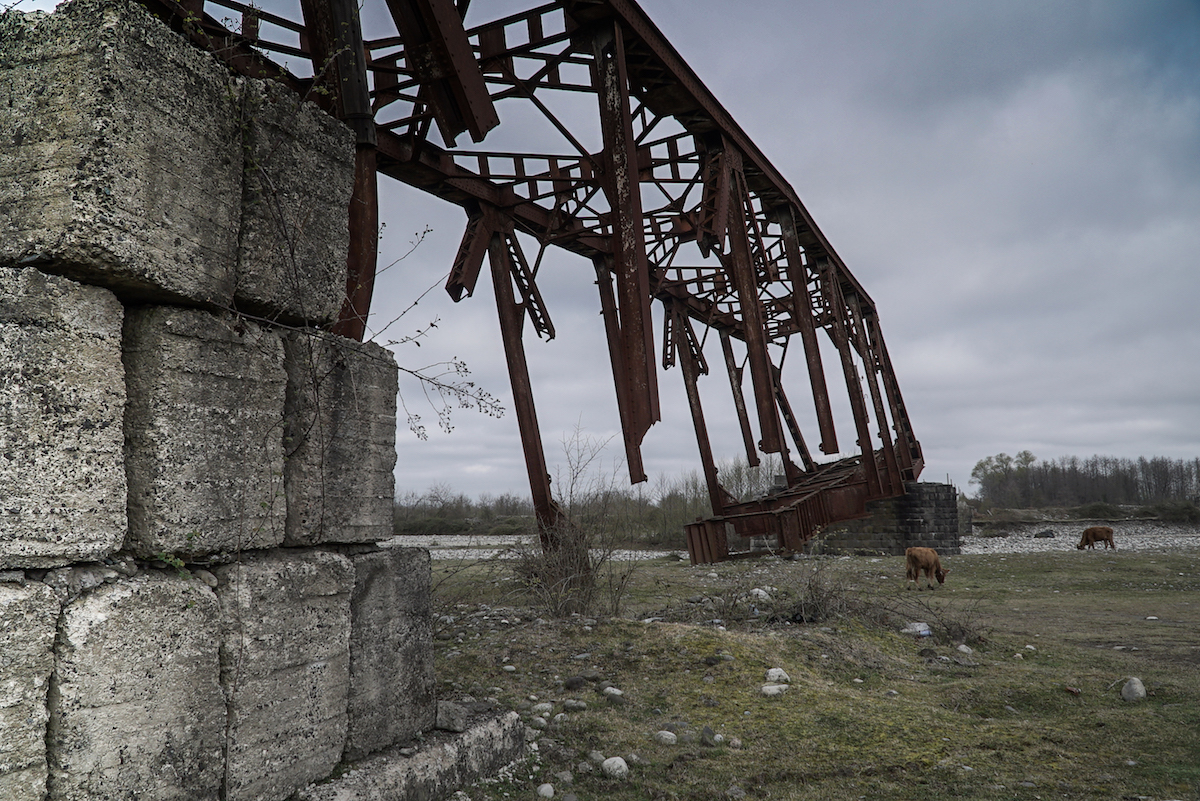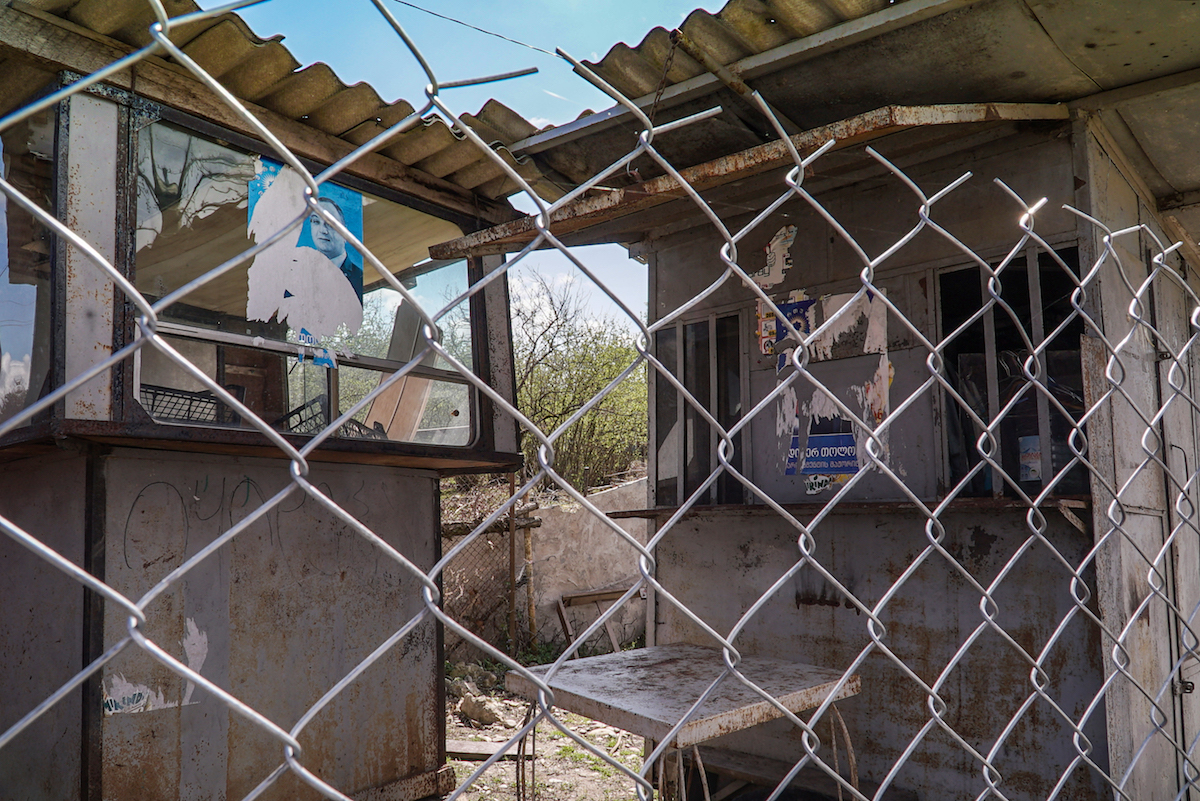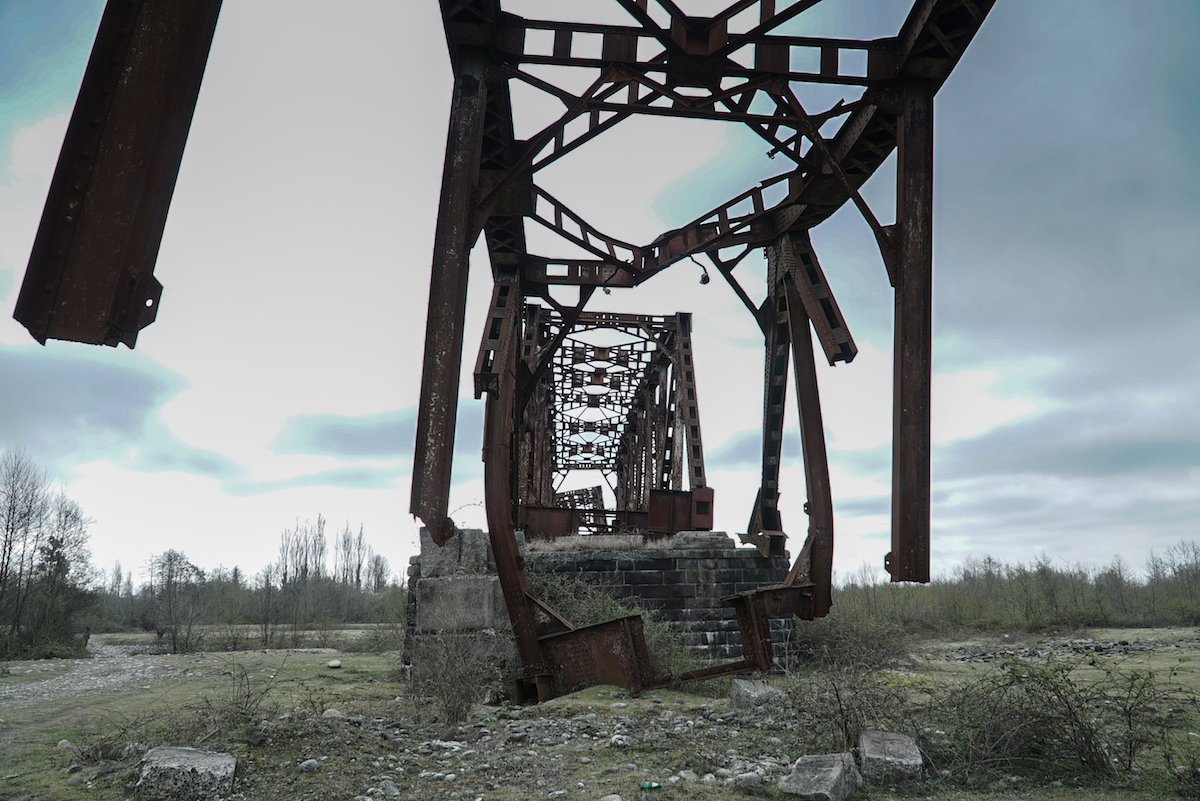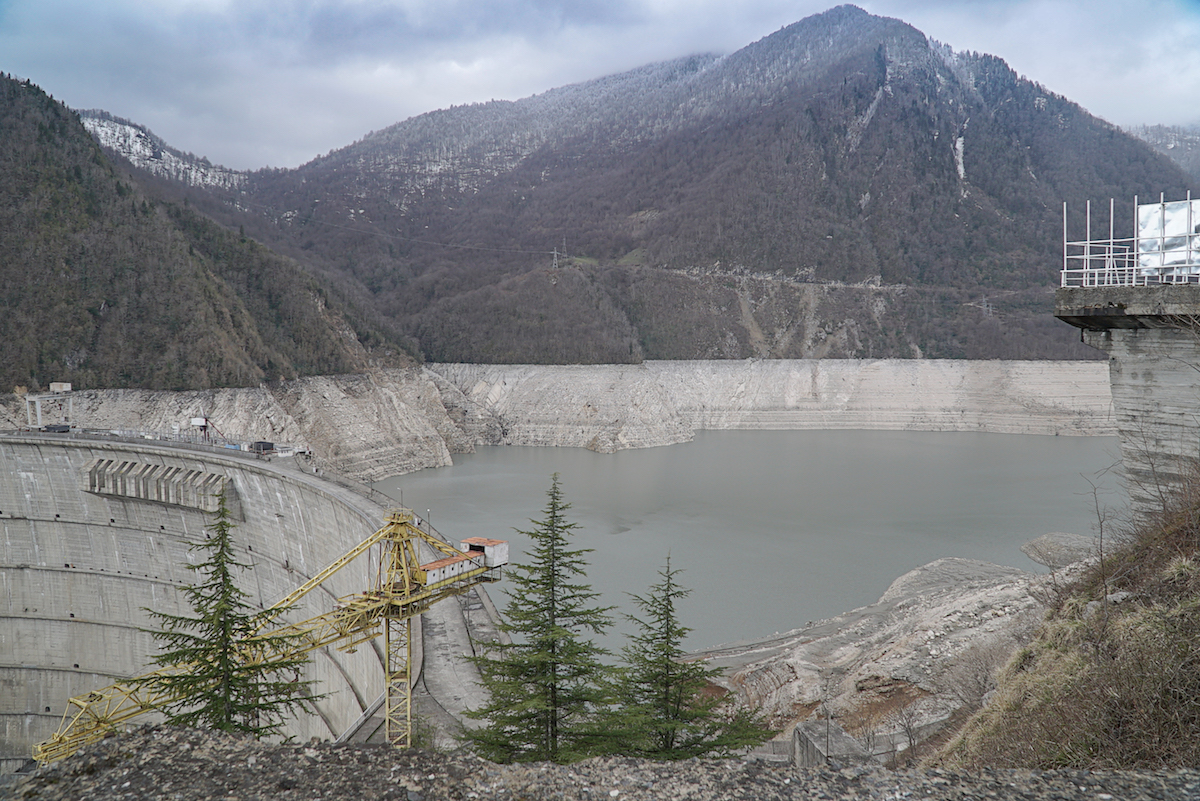Abkhazia-Georgia: line of demarcation - a quarter century after the war
Text, photo and video produced by JAMnews partners from the Ukrainian Hromadske TV

“Nothing is changing here. Everything has been trampled down. Governments come and go but nothing good is happening here,” Terenti Kvaratskhelia, an owner of a cafe near the Georgian checkpoint across the Inguri bridge, describes the situation along the demarcation line between Abkhazia and the other part of Georgia. For a quarter of a century, he has been living and working along this de facto border between Abkhazia and the rest of Georgia, as the separating line is sometimes mentioned in the official discourse.
The year 2017 marks the 25th anniversary of the start of the Georgian-Abkhaz war of 1992-1993. This conflict has been ‘frozen’ for more than two decades. But is it true that nothing really changes here, as it seems to those living in this reality? Hromadske TV spent four days along the administrative boundary line separating Abkhazia and the rest of Georgia to see how life is in the “frozen zone”.
The borderline
Near the checkpoint at the administrative border over the Enguri bridge in the Georgian village of Rukhi, one would not notice soldiers. Even if they have a presence here, it is invisible. The police are in charge of controlling the situation. There are no queues – we see neither humans nor vehicles. Cows are roaming freely. A cart, drawn by horses, is gradually filled with people. This is a type of local service to transport passengers from one side of the actual “border” to the other. A kind of horse-drawn transfer for the elderly and those who are in a hurry or tired.
The bridge over the Enguri River is the only place through which ordinary citizens can cross the administrative border. However, there is one more technical checkpoint Lakubirkhua to serve the Enguri hydroelectric power station, which is divided between Abkhazia and the rest of Georgia by the river.

According to the OSCE observers, approximately 1,000 people cross the bridge coming from one side to the other every day. Their number has considerably increased after the Abkhaz side closed two of its four crossing points in March 2017. Since then, the crossing points Nabakaya and Otobaya are not working.
People come from Abkhazia to go to a market in the neighboring Georgian city of Zugdidi. Children living in Abkhazia and attending schools in the other part of Georgia also have to cross the administrative border. Since the other two crossing points were shut down, their parents try to arrange a stay for them at some relatives living in the Georgian villages, where they would spend five school days and return home only on weekends. The locals say that it takes between 15 minutes and one hour to cross the de facto border.
We are asking those living in Abkhazia and crossing into the Georgian-controlled side whether they face any challenges at the checkpoint, whether they are happy about the existing procedures. They all say that there is really no problem currently if our question is about crossing the Enguri River. Behind this easy crossing is Georgia’s conscious policy with regard to those living in the separatist republic.
For Georgia, the administrative border is a point for contacts. Georgia allows vehicles with Abkhaz number plates and does not demand additional documents for citizens of the self-proclaimed republic, which has been recognized by four member countries of the United Nations: Russia, Venezuela, Nicaragua and Nauru (the latter is a tiny island in the Pacific with a population of approximately 10,000).
Those Abkhaz and Georgian nationals which live on the Abkhaz-controlled side are not required to present any additional documents in order to cross into the Georgian-controlled territory. Next to the police station on the Georgian side, there is a representation of a Georgian bank on wheels. Right here, people living in Abkhazia who hold Georgian passports, get state-provided pensions and social allowances immediately after crossing the Inguri bridge, without having to wait in a long queue. Here, it is considered a natural process, rather than “pension tourism.”
At the same time, for the self-proclaimed government of Abkhazia this is the state border, rather than just a separating line. The Abkhaz side and the Russian law enforcers on the other side of the Inguri Bridge do not allow Georgian vehicles to enter and demand both Georgian citizens and foreigners to present entry visas.
Citizens of the Commonwealth of Independent States can cross into Abkhazia and leave through the Psou crossing point. As journalists, we tried to get the Abkhaz entry visas on the Georgian side of the checkpoint but we were refused.
Many people in Abkhazia still keep their Georgian passports. Yet another checkpoint is located in the Georgian village of Khurcha. Through it, residents of the adjacent Abkhaz villages can get to the territory controlled by Georgia very quickly. However, the Abkhaz government has closed that checkpoint this year. Locals point to a building towering over the fence: they tell us that it is the home of the Russian military.
A taxi driver Enver Pertaia is standing close to the closed checkpoint with his hands spread wide: life has stopped here.
“It has become tougher. We used to live together all the time. For funerals, weddings – we were going back and forth. I have no documents to go to the Abkhaz side. Those who have them have to take a detour to get there. They must hold Abkhazian passports. Who would allow me to enter Abkhazia with my Georgian passport?” he is standing by his taxi, in which he has nobody to drive now. In the past, working as a taxi driver was profitable, he adds.

Right at the Khurcha crossing point, in May 2016, an Abkhaz “border guard” Rashid Kanji-Ogli shot dead a Georgian citizen, Giga Otkhozoria. The latter was trying to negotiate transportation of some goods to the Abkhaz-controlled side. An argument between them ended in tragedy. Kanji-Ogli ran back to Abkhazia. In Georgia, he was sentenced in absentia to 14 years of imprisonment.
This case attracted special attention due to the cruelty of the murderer: the Abkhaz national crossed the administrative boundary line and, right in front of the Georgian cameras killed the Georgian citizen, who had previously tried to avoid the conflict, the Georgian side claims.
The bridge to nowhere and Abkhaz estimates
On one side of the administrative boundary line, there are relatively liberal crossing procedures. On the other – trade and cargo transportation are red lines, which Georgia does not cross. There is no legally allowed trade relations with the breakaway region. However, locals talk about smuggling and “black holes” off the record.

In the Georgian village of Ganmukhuri, one can observe ruins of a bridge. Once it provided a connection to the other side, but now it leads to nowhere. Nobody has restored it, which was a well-calculated position of the local authorities. In the past, this bridge served to link Abkhazia to the rest of Georgia through a railway, which was used for transporting citruses directly to Armenia, Azerbaijan and other countries. Now, in order to deliver Abkhazia-grown hazelnut or oranges to Armenia, they have to be transported detouring through the entire South Caucasus. In such conditions, Abkhazians reoriented its exports to Russia.
In Georgia, it is believed that restoration of the railway communication with Abkhazia would equal to recognizing legitimacy of its government. There has always been a consensus concerning this question in the country.
Georgia does not allow transportation of cargo coming from Abkhazia and does not show a will to rebuild the railway but at the same time, Georgia, not Russia, covers expenditures for generating electricity for Abkhazia and pays for the additional import of electricity from Russia.
The purchase of electricity is needed when the water level in the reservoir drops to a critical level or the Enguri hydropower plant (HPP) stops operation for repair works. During and after the conflict, the Georgians and the Abkhazians have bee operating this gigantic HPP on the Enguri River jointly.

Without the Enguri HPP, Abkhazia would be left without electricity and would need to import its entire supply from Russia. At the same time, Enguri HPP provides electricity for the western part of Georgia.
Slums
In the Georgian city of Zugdidi, one would see a half-ruined building – without a water supply and a sewage system – which has been sheltering internally displaced persons (IDPs) from Abkhazia. People living in this slum survive on 45 Lari (USD 18), a monthly allowance for IDPs and another allowance for socially vulnerable people in the amount of 160 Lari (USD 66). They have been waiting for new apartments in newly built blocks for 24 years.
As one goes inside, one looks through an open door of one dwelling on the first floor, and sees that smoke is coming out – something is getting burnt. But nobody pays attention. People remain seated at a table and keep on chatting about something. In another apartment, people are celebrating – they have received a new apartment from the government as a gift.
It has been estimated that Georgia would need 30 more years to provide housing for its 273,411 internally displaced persons from Abkhazia and South Ossetia and address all other social problems for them. This is the number of people who hold the status of IDPs currently, according to the official figures.
Head of the Zugdidi City Council, Giorgi Todua, explains the scheme of financing construction of new housing for IDPs: “The Ministry of Internally Displaced Persons from the Occupied Territories, Accommodation and Refugees of Georgia has payed for providing new housing for the IDPs in Zugdidi. The municipal budget also has some funds available. But of cause, that is not enough.”
Not everybody has the right to a state-provided new apartment: IDPs have to fill in application forms, after which they get evaluation scores. Those who receive the maximum number of scores will get apartments. Others will receive just financial compensation.
The state does provide support but very slowly. After a quarter of a century following the armed conflict, the number of problems has not declined for IDPs, Iago Fasandze says. He set up a non-governmental organization to support IDPs. His family was forced to flee from Abkhazia due to the war.
“The government is building houses for IDPs. But they have many other problems. For example, as an NGO, we have no ability to help them quickly. The process of constructing homes for them is too slow,” he added.
Medical treatment on the boundary line
At the border crossing point, one may notice an unusual development: an ambulance with the Abkhaz number plate arrives at the Georgian checkpoint. Simultaneously, as a Georgian ambulance stops there, the Abkhazian medical doctors hand over a man on a stretcher bed to their Georgian counterparts. Those living in Abkhazia prefer to get medical treatment in Georgia, where they are involved in a medical insurance scheme.
Currently, the Georgian government is constructing a multi-profile medical clinic in the village of Rukhi. It will be open for Abkhaz nationals. For safety reasons, Georgia withholds information about Abkhaz patients getting treatment at Georgian hospitals. For example, journalists cannot obtain information on the number of patients from Abkhazia receiving treatment in Georgia.
“There is a medical program for those living in Abkhazia: they all get treatment free of charge. I think such programs are important for future reconciliation with those people. But the other side is not that open. I mean the Abkhaz people, not Russians. This is the Russian policy,” Giorgi Todua explained.
Reconciliation
“We should win back the hearts of people – this is important,” says Giorgi Todua. Can this prevail or offset the influence and importance of Russia in this frozen conflict?
Abkhazia and Russia have created joint military unions and since then, various Russian military facilities have appeared on the Abkhaz territory. Also, Russia is subsidizing the separatist republic and spreads its propaganda through the Russian-language media.
After a quarter of a century Georgia has placed a bet on winning the people’s hearts, while Russia is betting on the territory. But victory of any of those strategies can not guarantee that Georgia’s internally displaced persons, those who were fighting on behalf of Georgia during the war, will ever get a change to return to Abkhazia. These people know well what the word “frozen” means – endless waiting to go back home.



















